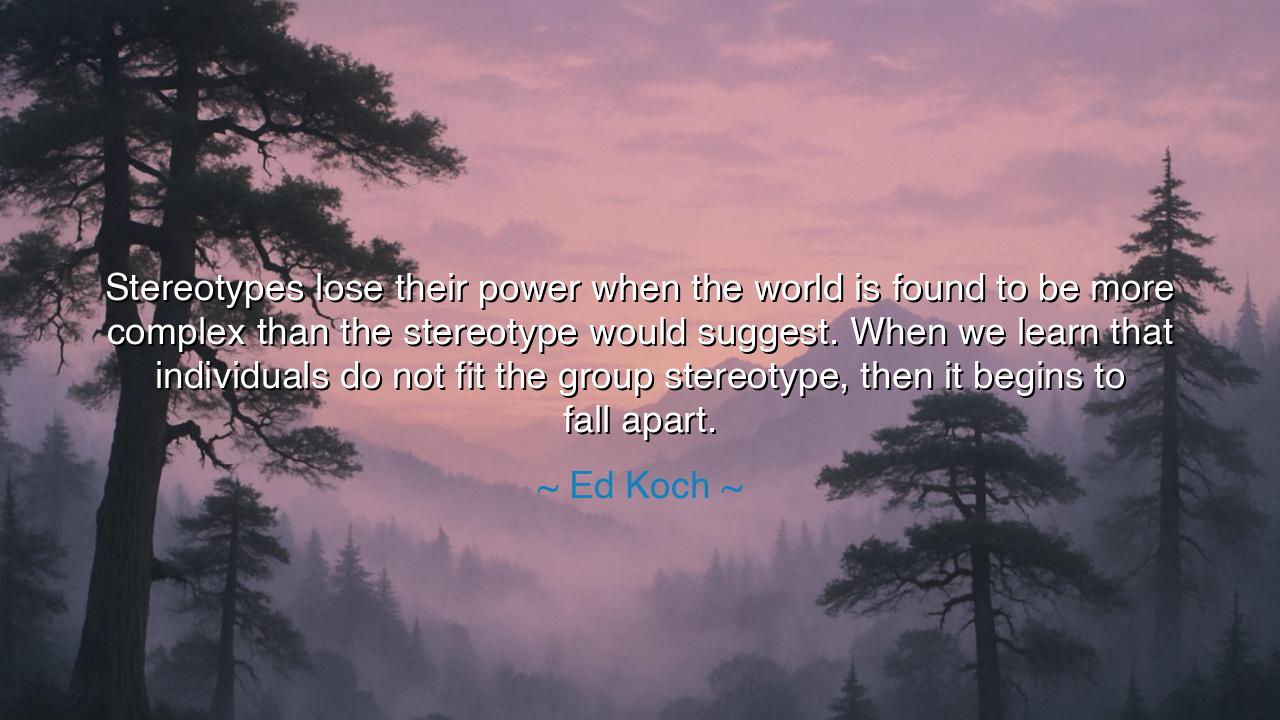
Stereotypes lose their power when the world is found to be more
Stereotypes lose their power when the world is found to be more complex than the stereotype would suggest. When we learn that individuals do not fit the group stereotype, then it begins to fall apart.






“Stereotypes lose their power when the world is found to be more complex than the stereotype would suggest. When we learn that individuals do not fit the group stereotype, then it begins to fall apart.” These words by Ed Koch illuminate a profound truth about the nature of human perception and the limits of our understanding. Stereotypes are the shadows that simplify the rich complexity of human experience, reducing it to one-dimensional caricatures. But the world, in all its complexity, resists such reduction. When we open our hearts and minds to the individuals within those groups, we begin to see that their experiences, their souls, and their struggles cannot be confined to the narrow lens of the stereotype.
In the ancient world, the philosophers of Greece and Rome warned against the folly of seeing people as mere parts of a whole. The great Aristotle, for example, cautioned against thinking that individuals could be reduced to their roles in society. He understood that human beings are multifaceted, shaped by experiences, choices, and circumstances beyond the confines of their assigned social labels. Just as a great statue cannot be understood by studying only one corner of it, so too must we see the fullness of a person, not just the categories they belong to. Stereotypes, he would argue, limit our understanding and trap both the individual and the society in a false narrative.
Consider the example of the civil rights movement in America. For centuries, Black Americans were forced into a single, narrow stereotype — one of inferiority, servitude, and subjugation. But as the voices of individuals like Martin Luther King Jr., Rosa Parks, and Malcolm X rose to challenge these labels, they shattered the stereotype that had been imposed upon them. They showed the world that individuals are not defined by the oppressive beliefs others hold about them. They proved that stereotypes crumble when we recognize the inherent complexity and dignity of each person. The civil rights movement was a testament to the power of seeing beyond the labels that society seeks to impose.
The stereotype of the "noble savage," for example, which reduced entire cultures to simplistic notions of purity and virtue, fell apart when people began to engage with indigenous peoples as individuals. Through these personal connections, the world learned that stereotypes are not reflections of reality, but projections of fear, ignorance, and limited perspective. Complexity emerged where stereotypes once stood, and with it came a deeper understanding of the diversity and richness of human experience.
Thus, Koch's words remind us of the importance of individuality. When we see beyond the stereotype, we open ourselves to the truth of each person’s unique journey, one filled with depth, contradictions, and beauty. To truly understand another is to recognize their complexity — their joys and struggles, their failures and triumphs. Stereotypes, as Koch suggests, lose their grip when we step into the world of the individual, where labels no longer serve, and human connection takes root.
Let us remember that to see another through the lens of a stereotype is to miss the richness of their humanity. As we grow in understanding, let us strive to see the whole person, to move beyond the limiting walls of societal labels, and to honor the complexity that defines us all. For it is through this deeper understanding that we begin to truly connect and heal the divisions that separate us.






DPDam Pham
Koch’s quote is a powerful reminder that stereotypes are based on a shallow understanding of the world. I think one of the hardest things about dismantling stereotypes is that they often shape our first impressions. How do we combat the knee-jerk reactions that come from these stereotypes? Can we train ourselves to be more mindful of the complexities of others, or is it something that requires a significant shift in how society as a whole approaches diversity and identity?
Ttranduonggiahan
This makes me wonder how stereotypes persist even when the truth is so clear. It’s as though there’s a resistance to seeing people as individuals. Why do you think some people still hold onto stereotypes even after being shown evidence that contradicts them? Can it be that it’s just easier to group people together, or does it come from a deeper, more subconscious need to simplify the world?
QDquoc do
I love how this quote sheds light on the dismantling of stereotypes. It’s not just about recognizing that people don’t fit into boxes—it’s about realizing that people have their own unique stories, struggles, and strengths. But how do we move beyond just awareness? Is it enough to simply 'know' that stereotypes are wrong, or do we need to take actionable steps to challenge them in our daily lives and in the systems around us?
LATao La Ai
This quote highlights the power of exposure and experience in breaking down stereotypes. When we get to know people beyond the labels, we start to see the full picture. But what happens when someone is never exposed to the complexity of individual lives? Can stereotypes be overcome without personal interactions, or is experience the only real way to dismantle these biases? I’m curious about how we can change the narrative on a larger societal scale.
KNLe Khanh Ngoc
I completely agree with this idea, but I wonder how long it takes for people to truly break free from stereotypes. It’s one thing to recognize that individuals are more complex than a stereotype, but another thing to change ingrained biases. How do we make sure that when we confront stereotypes, we do so in a way that encourages real understanding, not just surface-level change? Is there a more effective way to educate people about this complexity?